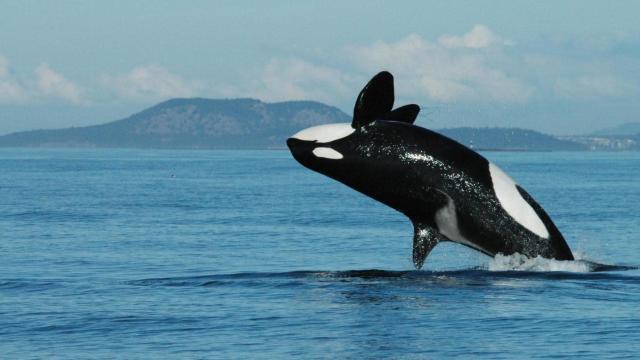New research shows that post-menopausal orca grandmothers maintain an important role in their pods by boosting the survival rates of their grand-calves.
Orca calves without postmenopausal grandmothers experience higher rates of mortality than other calves, especially when food is hard to come by, according to new research published earlier this week in Proceedings of the National Academy of Sciences.
The authors of the new study, led by marine biologist Daniel Franks from the University of York, believe postmenopausal grandmothers have the requisite experience, along with the extra time and resources, to increase the survival of their grandkids. And by doing so, the grandma orcas don’t just help keep their beloved grandkids alive”they also increase the chances that their genes will be passed down to further generations.
Male orcas don’t live much past their 30s, but females continue to bear offspring well into their 30s and 40s, and then go on to live for many decades after they’ve become post-menopausal. Species that live far beyond their reproductive years are exceptionally rare, a short list that includes humans and four whale species, namely orcas, belugas, short-finned whales, and narwhals. Biologists aren’t entirely sure why this added post-reproductive longevity (or curtailed reproductive capacity, depending on how you look at it) is such a rarity, but studies like this can provide some needed clues.
Indeed, the research could speak to the long human lifespan, and how postmenopausal women contribute to the so-called “grandmother effect,” that is, the apparently beneficial, or adaptive, value of having grandmothers around to care for grandchildren. The new research is interesting because it suggests the grandmother effect applies to at least one other species, namely the orca.
In addition to the University of York researchers, the new study involved scientists from the University of Exeter, the Centre for Whale Research in the U.S., and Fisheries and Oceans Canada. The researchers pored over 36 years’ worth of population data for two groups of orcas living off the North West Pacific Coast of Canada and the United States.
These orcas were made up of multiple family groups, and they fed primarily on Chinook salmon. The researchers were able to distinguish individuals through their physical characteristics, such as the shape and size of their fins, skin patches and scratches, among other distinguishing features. Familial relations were determined through observational analysis; mothers, for example, frequently interact with their offspring.
In total, the scientists analysed the survival rates of 378 orca grandchildren, or grand-offspring as they’re termed by scientists, whose grandmothers were known. Taking the abundance of annual salmon into account, the researchers discovered that, in the two years following the death of a postmenopausal grandmother (as distinguished from breeding grandmothers), the chance of survival for a female or male grandchild was significantly reduced. Specifically, orca calves with a dead grandma had on average a 4.5 times higher chance of death within those two years, a statistic that grew even higher during times of food scarcity.
“The study suggests that breeding grandmothers are not able to provide the same level of support as grandmothers who no longer breed,” said Franks in a press release. “This means that the evolution of menopause has increased a grandmother’s capacity to help her grand-offspring.”
According to the authors, the post-menopausal grandmas are able to reduce the mortality of their grandchildren due to their experience at acquiring food resources and by sharing this food with younger relatives. They also keep an eye on potentially wayward calves, a grandmotherly duty otherwise known as babysitting.
“The death of a post-menopausal grandmother can have important repercussions for her family group, and this could prove to be an important consideration when assessing the future of these populations,” said Franks. “As salmon populations continue to decline, grandmothers are likely to become even more important in these [orca] whale populations.”
Importantly, this research doesn’t explain the longevity of postmenopausal orca females or any species with these added lifespans for that matter. Elephant grandmothers, for example, are able to breed until the end of their lives, yet they’re still able to tend to grandchildren”an observation the authors were careful to include in their study. There’s also the other side of this coin to consider: the cost of being able to reproduce until death, as the authors explain in their paper.
Examples such as this demonstrate that costs of continued reproduction are needed to explain why reproduction is terminated before the end of life. In killer whales and humans, intergenerational reproductive conflict has been found to provide such a cost, and thus select for early reproductive cessation. In [orca] whales, when mothers and daughters cobreed, the calves of mothers from older generation have significantly higher mortality.
What this essentially means is that the reason for a curtailed reproductive capacity won’t likely be solved by invoking one simple hypothesis, such as the grandmother effect, reproductive conflict, or something else. Acknowledging this, the authors call for an “integrative approach” to the problem, in which scientists consider a host of reasons. Only then “can we fully explain why [orca] whales have evolved one of the longest postreproductive life spans recorded for all nonhuman animals,” conclude the authors in the study.
With all this said, it’s important that we don’t bury the lede: postmenopausal orca grandmothers contribute to the grandmother effect. That’s a pretty damn cool conclusion on its own, so let’s hear it for grandparents”whether they’re orcas or humans.
